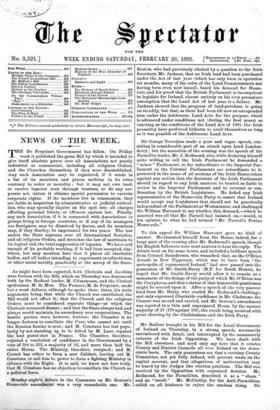Mr. Balfour brought in his Bill for the Local Government
of Ireland on Thursday, in a strong speech, necessarily encumbered with detail, and interrupted by the unmannerly outcries of the Irish Opposition. We have dealt with the Bill elsewhere, and need only say here that it creates County and District Councils all over Ireland on the demo- cratic basis. The only guarantees are that a revising County Committee, not yet fully defined, will prevent waste on the capital account, and that allegations of malversation may be heard by the Judges like election petitions. The Bill was received by the Opposition with organised derision. Mr. Redmond, for the Parnellites, described it as a " sham " and an "insult." Mr. McCarthy, for the Anti-Parnellites, called on all Irishmen to reject the unclean thing. Sir William Harcourt condemned it as " insulting to the people of Ireland "—who under the Bill are made masters of their own municipal affairs—and told Mr. Balfour to take it away tts rubbish ; but -all the same, he evidently waits for Mr. Gladstbne's atrival. The reception of the pro- posal, in fact, proves its entire inopportuneness, Irishmen just now being in no mood for any sort of reasonable argu- ment. It is said that many Tories are also unfavourable to the Bill, but we trust and believe that, on consideration, they will perceive that more important things are at stake than any such Bill, bad or good, opportune or inopportune, can possibly be.



































 Previous page
Previous page